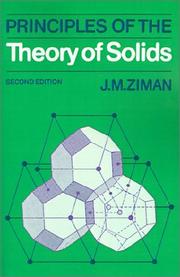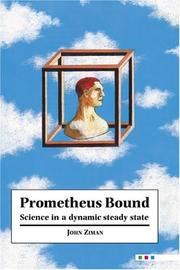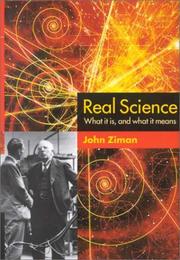| Listing 1 - 3 of 3 |
Sort by
|

ISBN: 0521083826 9781139640800 1139640801 9780521083829 1316086550 1139635476 1139648446 1139644076 1139637967 9781139644075 9780521297332 0521297338 Year: 1972 Publisher: Cambridge : Cambridge University Press,
Abstract | Keywords | Export | Availability | Bookmark
 Loading...
Loading...Choose an application
- Reference Manager
- EndNote
- RefWorks (Direct export to RefWorks)
Professor Ziman's classic textbook on the theory of solids was first published in 1964. This paperback edition is a reprint of the second edition, which was substantially revised and enlarged in 1972. The value and popularity of this textbook is well attested by reviewers' opinions and by the existence of several foreign language editions, including German, Italian, Spanish, Japanese, Polish and Russian. The book gives a clear exposition of the elements of the physics of perfect crystalline solids. In discussing the principles, the author aims to give students an appreciation of the conditions which are necessary for the appearance of the various phenomena. A self-contained mathematical account is given of the simplest model that will demonstrate each principle. A grounding in quantum mechanics and knowledge of elementary facts about solids is assumed. This is therefore a textbook for advanced undergraduates and is also appropriate for graduate courses.
Solid state physics --- Physique de l'état solide --- 539.2 --- 538.9 --- #WSCH:AAS2 --- Physics --- Solids --- Properties and structure of molecular systems --- Physics of condensed matter (in liquid state and solid state) --- Solid state physics. --- 538.9 Physics of condensed matter (in liquid state and solid state) --- 539.2 Properties and structure of molecular systems --- Physique de l'état solide

ISBN: 0521434300 0521019125 0511585063 0511001576 9780511001574 9780511585067 9780521434300 Year: 1994 Publisher: Cambridge : Cambridge University Press,
Abstract | Keywords | Export | Availability | Bookmark
 Loading...
Loading...Choose an application
- Reference Manager
- EndNote
- RefWorks (Direct export to RefWorks)
After expanding steadily for centuries, science is reaching its limits to growth. We can no longer afford the ever increasing cost of exploring ever wider research opportunities. In the competition for resources, science is becoming much more tightly organised. A radical, pervasive and permanent structural change is taking place. It already affects the whole research system, from everyday laboratory life to national budgets. The scientific enterprise cannot avoid fundamental change, but excessive managerial insistence on accountability, evaluation, 'priority setting', etc. can be very inhospitable to expertise, innovation, criticism and creativity. Can the research system be reshaped without losing many features that have made science so productive? This trenchant analysis of a deep-rooted historical process does not assume any technical knowledge of the natural sciences, their history, philosophy, sociology or politics. It is addressed to everybody who is concerned about the future of science and its place in society.
Research --- -Science --- -Science and state --- Science --- Science policy --- State and science --- State, The --- Natural science --- Science of science --- Sciences --- Science research --- Scientific research --- Information services --- Learning and scholarship --- Methodology --- Research teams --- Management --- Social aspects --- Government policy --- Science and state. --- Management. --- Social aspects. --- Science and state --- Science and society --- Sociology of science --- Research management

ISBN: 052177229X 0521893100 9780521893107 0511151373 0511049749 0511541392 0511310587 1280421304 9786610421305 0511172559 9780521772297 9780511541391 1107119634 0511009666 9780511009662 9780511151378 Year: 2000 Publisher: Cambridge : Cambridge University Press,
Abstract | Keywords | Export | Availability | Bookmark
 Loading...
Loading...Choose an application
- Reference Manager
- EndNote
- RefWorks (Direct export to RefWorks)
Scientists and 'anti-scientists' alike need a more realistic image of science. The traditional mode of research, academic science, is not just a 'method': it is a distinctive culture, whose members win esteem and employment by making public their findings. Fierce competition for credibility is strictly regulated by established practices such as peer review. Highly specialized international communities of independent experts form spontaneously and generate the type of knowledge we call 'scientific' - systematic, theoretical, empirically-tested, quantitative, and so on. Ziman shows that these familiar 'philosophical' features of scientific knowledge are inseparable from the ordinary cognitive capabilities and peculiar social relationships of its producers. This wide-angled close-up of the natural and human sciences recognizes their unique value, whilst revealing the limits of their rationality, reliability, and universal applicability. It also shows how, for better or worse, the new 'post-academic' research culture of teamwork, accountability, etc. is changing these supposedly eternal philosophical characteristics.
Sociology of knowledge --- Philosophy of science --- Science --- 001 --- Normal science --- Scientific method --- Logic, Symbolic and mathematical --- 001 Wetenschap en kennis--(algemeen) --- Wetenschap en kennis--(algemeen) --- Methodology --- Philosophy --- Philosophy. --- Methodology. --- Hulpwetenschappen --- filosofie. --- Sciences --- Philosophie --- Méthodologie --- Filosofie. --- Science - Philosophy. --- Science - Methodology.
| Listing 1 - 3 of 3 |
Sort by
|

 Search
Search Feedback
Feedback About
About Help
Help News
News